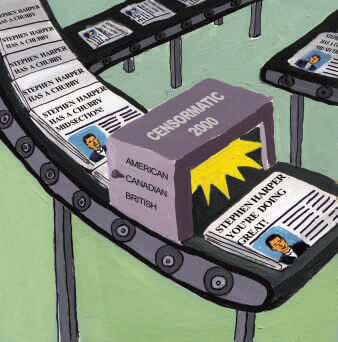Under hot stage lights, Canada’s four political party leaders stand behind lecterns, addressing the nation. Their faces thick with makeup, each takes his turn expounding on national unity and trading insults about government accountability. Jack Layton’s head is shiny, Stephen Harper’s brow furrowed. It’s January 10, 2006, and this is the second French-language debate of the election season—the final battleground before Canadians head to the polls. It’s a familiar scene, and one voters can expect to see again soon. But tonight, with the cameras registering every hesitation and nervous twitch, the leaders breathe a little easier knowing one thing: if they screw up, they won’t be mocked. Not on television, at least. That’s because Canadian broadcasters, including cbc and ctv, have a deal with the federal parties to restrict the use of debate footage to news and current affairs programming. The televised debates, perhaps the most significant public events of the election, are off limits to Canadian comedy shows.
Following the broadcast, the nation’s satirical triumvirate—the Rick Mercer Report, This Hour Has 22 Minutes, and the Royal Canadian Air Farce—played nice and didn’t touch the footage. Air Farce skirted the issue by impersonating Gilles Duceppe in a mock debate. Only Rick Mercer publicly registered discontent, telling the New York Times, “When three or four networks are at the table with three or four political parties, someone is going to be the victim.” Gerald Lunz, the Mercer Report’s co-creator and producer, was quiet at the time but has since shrugged it off by belittling the content. “If I felt it was killer shit, I would have used it anyway,” he says.
South of the border, the folks at The Daily Show with Jon Stewart thought otherwise. On January 19, broadcasting across ctv and Comedy Network airwaves into 465,000 Canadian homes, Stewart launched into six minutes on the debates. After airing some of the French-language contest, he deadpanned, “You may have noticed the quality of that footage was a bit grainier than the footage we usually steal. That’s because we had to get it from the Internet.” He then introduced more “forbidden fruit of debate footage that the cbc and the Parliament felt was too explosive for fake news”—two dreary Stephen Harper sound bites proving that Lunz was right, this stuff is boring, but that boring, in a blue-plaid tie, can be funny too. Canada is famous for birthing satirists who have gone on to take down the American establishment. How did we get to the point of needing Jon Stewart to make fun of our politicians for us? The answer dates back to the parting of the Red Sea.
Of all the commandments handed down to Moses, it’s tricky number nine (eight, if you’re Catholic) that still haunts satirists. “Thou shalt not bear false witness” is Judeo-Christianity’s oldest defamation law and the source of the daily battle a comedy writer has with herself: how do I say what I want about the latest Scientology-addled celebrity without getting sued?
Both Egyptian and Roman societies forbade slanderers, but it was Yahweh’s decree that inspired King Alfred, who proclaimed himself the first Anglo-Saxon monarch in the ninth century, to rule that anyone who made a false claim should have his tongue excised. The law continued to develop through the Middle Ages until 1606, when the Archbishop of Canterbury and the Bishop of London were “traduced and scandalized” by an unnamed gossip. The courts decided that it didn’t matter if the slander was true; sterling reputations had been tarnished. The defendant was guilty.
The case laid the foundation for modern defamation law, the offence of bringing someone into undeserved disrepute by making false statements, whether by slander, which describes false verbal statements, or libel, which describes defamatory claims made in print or broadcast. Canada’s defamation laws haven’t evolved much since emerging from their ancient gene pool. In a stubborn refusal to adhere to the modern legal status quo, defendants in a defamation case here bear the burden of proof—that is, they are guilty until proven innocent. Our law presumes that the defendant’s words are false and that the plaintiff has been damaged by the accusations. Unfortunately, “I was just joking” is not a defence.
As a result, the Canadian system leaves joke writers wide open to litigation. For example, when This Hour Has 22 Minutes comedian Mary Walsh told Preston Manning that his speech was “more edifying in the original German,” the Reform Party threatened to sue. Had they followed through, it would have been up to Walsh and her producers to prove what they implied was true—that Preston Manning was a fascist. Of course, we all know it was a joke and not all jokes are true. But when a joke damages someone’s reputation, then it’s no longer funny—it’s libellous.
TV producers take the threat of litigation seriously, especially in Canada, where budgets are small and opportunities for work are limited. According to Maureen Riley, who has worked on the defunct late-night talk show Open Mike with Mike Bullard and the Comedy Network’s annual Cream of Comedy special, it’s up to individual producers to decide how far to take the jokes. Some are bigger risk-takers than others, but they all share the same concern. “In Canada, which is such a small pond, let’s say you make a joke about Starbucks and Starbucks sues your production company,” Riley says. “What network is going to want to work with you after that?” As a result, every episode of a satirical program is scrutinized by writers, producers, and lawyers for any joke that might send Conrad Black or Barbara Amiel staggering to their attorneys’ offices. Caution and comedy, together at last.
Rob Aske, long-time lawyer for 22 Minutes, is proud of his show’s record of never being sued, explaining that “the writers don’t make the mistake of crossing the line.” Michael Balazo, who wrote for Popcultured with Elvira Kurt, a Comedy Network original that was cancelled after its first season, raises the spectre of the C-word: censorship. And, ultimately, self-censorship. “You start getting trained to write less biting comedy,” he says, “which is really the antithesis of satire.” Given that Stuart Robertson, a Toronto-based media lawyer and co-author of The Charter and the Media, can’t remember the last time any Canadian television comedy was sued, perhaps the concern should be less with crossing the line than with not coming close enough to it.
Nothing in Canada’s current stable of television comedies approaches the impact of sctv in the 1970s and ’80s or The Kids in the Hall in the ’90s. The Royal Canadian Air Farce has been airing on cbc Television for seventeen years, at least ten too many. This Hour Has 22 Minutes, fourteen years and running, still has flashes of brilliance, but its formula has become predictable and stale. Rick Mercer, Newfoundland’s prodigal son, whose rants on 22 Minutes and then the Mercer Report assailed our complacency, was our best hope for political satire. Now he spends more time mugging with firemen and soldiers than he does toppling our sacred cows.
Rather than resurrecting the dying art of satire, Canadian networks are betting on safer fare. Two of the country’s top-rated shows, ctv’s Corner Gas and cbc’s Little Mosque on the Prairie, are both small-town sitcoms. Meanwhile, the ctv-owned Comedy Network hasn’t found a winning recipe and relies on US imports (which comprise over a third of its prime-time content) for its ratings.
American satirical shows are less inhibited, says former 22 Minutes writer Bob Kerr. “If we had that kind of power and could dance along merrily as we pleased, I think the comedy scene as far as satire goes would be a lot more popular here,” he adds. Kerr is referring to the protections afforded by the First Amendment, the first and most significant covenant in the US Constitution and the wellspring of Yankee satirical freedom. “Congress shall make no law . . . abridging the freedom of speech, or of the press.” It’s a clear and rigid prescription, though one that was overlooked until 1964.
It was the height of the civil rights movement, and the Committee to Defend Martin Luther King Jr. and the Struggle for Freedom in the South had taken out a full-page ad in the New York Times to raise money to defend King against a charge of tax evasion. The ad accused the Montgomery, Alabama, police department of being complicit in a campaign to smear the reverend’s good name. It also claimed that “Southern violators,” armed with shotguns and tear gas, had detained black students engaging in peaceful civil rights demonstrations. L. B. Sullivan, the city commissioner in charge of the police force, took these allegations personally. His reputation, he said, was ruined, and he sued the Times for libel. Up to this point in American juridical history, defamation cases had favoured the plaintiff. Sullivan was confident that the court would presume that what the Times had printed was untrue and that, to win his case, he’d only have to prove the paper had printed the libellous material.
The case made its way to the Supreme Court, where the judges ruled that the American legal system had been abridging free speech for close to 200 years. How could a society purport to embrace free speech if it assumed that everything voiced or written in the public domain was untrue? The court decided to place the burden of proof on the plaintiff rather than the defendant. Sullivan would have to prove that the contentious words were both false and published with malice in order to win the case. He couldn’t. Some of the accusations turned out to be untrue, but the Times didn’t know that when they printed them. A new precedent had been set, and American comics were effectively unmuzzled.
Prior to the 1960s, American comedy was dominated by “A rabbi, a Polack, and a Greek walk into a bar” jokes. Lenny Bruce, the comedian lionized after paving the way for daring stand-ups of the 1970s like Richard Pryor and George Carlin, went broke fighting two obscenity charges (the first and most famous for saying “cocksucker” on a San Francisco stage in 1961) that he felt violated his First Amendment rights. Though he was acquitted on both charges, it wasn’t until 1975 that the changes in American defamation law began to impact TV programming. That’s when Thornhill, Ontario, native Lorne Michaels debuted Saturday Night Live, the late-night sketch program that directly attacked politicians and social mores, often in the Weekend Update segment that popularized fake news. More than thirty years on, 11:30 p.m. on a Saturday night is no longer a cultural touchstone, but plenty of American satires have carried the torch. The Simpsons’ halcyon days lasted from 1991 to 1996, and South Park is still relevant after eleven seasons. The turn of the millennium saw a fresh injection of satire in The Daily Show, Chappelle’s Show, and, most recently, The Colbert Report.
In Canada, where freedom of speech is protected under Section Two of the Canadian Charter of Rights and Freedoms—but only, as stipulated in Section One, “to such reasonable limits prescribed by law as can be demonstrably justified in a free and democratic society”—it’s no wonder our satirical bounty has shrivelled and died. We’re being outperformed. We’ve got an unfriendly legal system, small budgets, nervous producers, and softballing writers versus First Amendment protection, big budgets, and, well, faster balls. Our bare-bones television industry doesn’t need to put everything on the line to make a great satirical show when it can just import one. And after years of doing just that, our producers and writers have forgotten how to deliver that knockout punch.
However, the gears may be shifting. Tony Burman, the editor-in-chief of cbc News—known for his brusque leadership and journalistic acumen, if not his sense of humour—has emerged as a possible saviour. Burman is the chair of the broadcasting consortium that cut the deal with the federal political parties to limit the use of election debate footage. Following Mercer’s outburst in the Times, The Daily Show’s “coverage” of the issue, and the small flurry of outrage in the blogosphere (led by the Toronto Star’s Antonia Zerbisias), Burman decided the footage should be made available to satirical programs.
With a new round of debates looming, he has reopened the satire issue with the consortium. Negotiations are still in the early stages, and even if all the broadcasters come to an agreement, the federal parties will have to consent before anything is ratified. Burman acknowledges that when it comes time to sit down with the politicos to talk about the debates, there may be more pressing matters to address but, he adds, “these programs, every year, are more popular and important.” Canadian politics could no doubt use the help in becoming more popular and important. Fingers crossed, Rick Mercer will be tearing Gilles Duceppe a new one for his podium demeanour this spring.
What confuses Burman is not why Mercer and the media complained, but why no one did it earlier. “This has been the arrangement since 1988,” he says, “and unless I’m suffering amnesia, I don’t recall it being an issue before.” If we want better Canadian satire, it looks as if asking would be a start.





